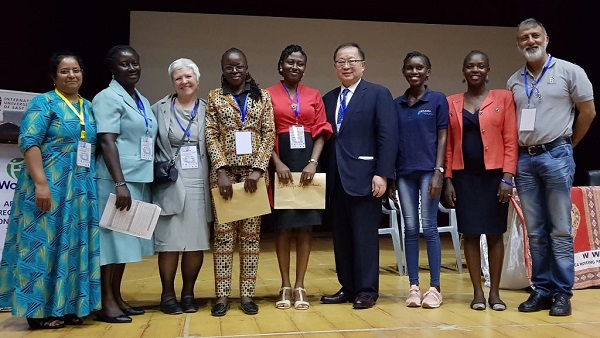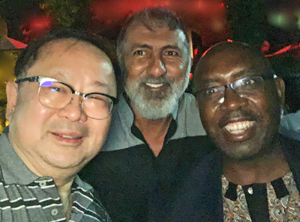From the President: July 2019
 Photo: Donald Li after presenting the Atai Scholarship to Dr Jessie Mbambo from Malawi and Dr Moysore Makinde from Nigeria. Other WONCA leaders include Amanda Howe and Shabir Moosa.
Photo: Donald Li after presenting the Atai Scholarship to Dr Jessie Mbambo from Malawi and Dr Moysore Makinde from Nigeria. Other WONCA leaders include Amanda Howe and Shabir Moosa.
Español Français 中文
My first official visit to Africa, to the WONCA Africa conference in Kampala, Uganda, was thoroughly enjoyable. Delegates from 32 different countries came to share their enthusiasm and experiences of developing family medicine across the continent and further afield. The conference was truly about person-centred primary health care. And it was a great opportunity to further encourage the medical students who attended, to pursue careers in primary care. The content of the conference talks and events clearly showed the commitment of family doctors in Africa to universal health coverage, primary health care, and building primary care teams at-scale in Africa. The enthusiasm and commitment of those present was palpable, and augurs very well for future primary care development in the region. We wish our African colleagues well in their efforts to advocate for the role of family medicine in Africa at the High-Level UN Meeting on Universal Health Coverage in New York in September 2019.
The attendance throughout the conference of the Acting Director of Health Systems of the WHO Africa regional office was particularly welcome. Successive WONCA Africa region Presidents and WONCA World have been frustrated in the past by the lack of engagement by the WHO Africa regional office. Following the signing of the MOU with WHO, and the encouragement of the WHO

Director General for increased engagement between WONCA and WHO regional and country offices, we redoubled our efforts. We welcome wholeheartedly the newly developing collaboration between WHO and WONCA in Africa and are ready to build on future collaborations.
Photo: Dr Donald Li, Prof Shabir Moosa, and WHO Africa representative, Dr Tumusiime Prosper,
We, in WONCA, need to be alert to the undermining of the profession of family medicine and its key role in delivering comprehensive primary care to communities globally. The global goal of universal health coverage simply will not be achieved without good quality comprehensive primary health care, delivered by competent, professional primary care teams. Irrespective of the resource capacity of countries across the globe, the aspiration, if not the immediate reality, should be to have sufficient qualified primary care teams in place to deliver that comprehensive person-centred primary health care. As individuals, the various members of the primary care team can provide some health support to populations. Working together, as a primary care team, the impact can be so much greater than can be achieved by the individuals working alone.
The recent editorial in the BMJ (reference BMJ 2019;365:12391 doi: 10.1136/bmj.12391, published 3rd June. Accessible at
https://www.bmj.com/content/bmj/365/bmj.l2391.full.pdf) referred to 45,000 community health workers, in Rwanda, serving as “the functional link between communities and health facilities, such as hospitals”. This may be a current reality. It is not aspirational. This is not delivering the comprehensive person-centred primary health care promised in the Astana Declaration. In order to deliver comprehensive primary care to communities, the ‘functional link’ between a community and the health service should be a qualified, competent, primary care team led and co-ordinated by a qualified family doctor. Development partners – bilateral and multilateral – as well as national governments, should be encouraged to invest in the growth of qualified primary care team members in order to achieve the promise of Astana. The reaction of those at the WONCA Africa region conference to the BMJ editorial was immediate and resulted in a strong response being drafted and submitted by participants. BMJ 2019;365:l2391accessible at
https://www.bmj.com/content/365/bmj.l2391/rr-3
Following on from our work at WHA in May this year, and in light of recent suggestions about who should deliver comprehensive primary health care, WONCA will be undertaking global research about effective primary care delivery based on qualified primary care teams. We will engage with WHO and colleagues from across the spectrum of primary care professionals to reflect both the reality and the aspiration of how effective primary care teams can deliver better, more cost-effective healthcare to communities. Of course, primary care teams should be tailored to individual country and community health needs, which is why there is no ‘one-size-fits-all’ list of the primary care team members. The professionals comprising a primary care team will differ in relation to health needs, resource availability, lead-time for professional training, and a host of other variables. It is the commitment to a professional primary care team itself which is critical to the successful implementation of comprehensive primary care. We hope to reflect that it can be a reality, even in resource-poor situations and, moreover, that even in resource-poor settings it is a more effective way of delivering comprehensive primary health care.